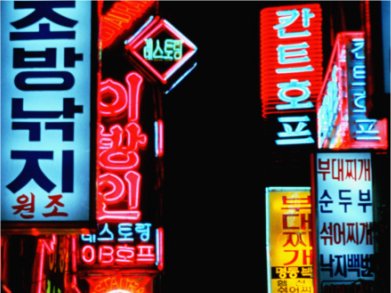What is a Post-Doc in Korea like? Eun Hea (Grace) Jho spoke with Vera Koester for ChemistryViews about her experiences.
Introducing Eun Hea (Grace) Jho
Tell us about yourself …
I did my Bachelor of Engineering (Civil and Environmental Engineering) at the University of Auckland (UoA) in New Zealand and continued with my PhD degree there with Dr. Naresh Singhal. During my PhD research, I looked at remediation of chlorinated compounds using modified Fenton’s reagent and the impacts of Fenton’s reactions on anaerobic microbial communities degrading chlorinated compounds. I am currently working as a Post-doc in Civil and Environmental Engineering Department at SNU in Seoul, Korea.
How did you end up in Korea?
After getting my PhD degree, I chose to move back to Korea and do a post-doc for a few years to learn more about the cultures, life styles, and working styles of Korea, where I was born. Since I was involved in an exchange program for one semester during my Bachelor’s degree, at Seoul National University (SNU), I asked one of the professors who taught me during the exchange program for a post-doc position.
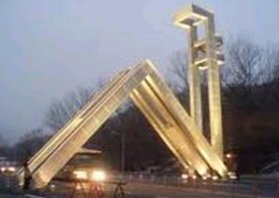
View of the entrance of SNU (shape made using initials of SNU in Korean: 서) (Photo: Eun Hea Jho).
What was the first thing you noticed when you got to Korea?
Seoul is larger and more crowded than Auckland. Everyone seems busy and occupied by something. At first, I was exhausted at the end of each day just because of more people and more of everything around me, but I am getting better with that. For example, waiting in a line for a long time is just an everyday thing you have to do when you want to do something in Seoul.

View of a traditional Korean market located near SNU.
In UoA, I could drive to a nice beach and have a cup of coffee when my experiments did not work out, but here in SNU that is impossible. You have to take several hours to go to the nearest beach. I sometimes miss the beaches in Auckland. Although you don’t have beaches nearby, there are still a number of different places where I can get coffee and have a rest on the SNU campus such as a pond near the main library and a hill near the dormitory.
And what about the University?
One of the nicest things about SNU is that it is located on Mt. Gwanak and that always provides me with a great view and refreshes me after getting sick of looking at my computer screen. I look forward to going tracking there sometime in the future.
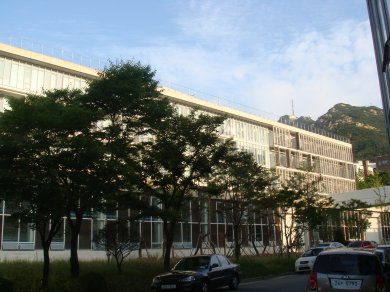
One of the engineering buildings at SNU with Mt. Gwanak at the background (Photo: Eun Hea Jho).
On the other hand, UoA is a big part of Auckland city and it is located in the middle of Auckland city. It has beautiful parks around the university where you can have a rest and enjoy a cup of coffee.
When I first came to SNU as a post-doc fellow, I found many differences in the life style in Seoul and how things are done at SNU and in our lab. Although there are things that are different from what I expected and sometimes things are hard to understand, I really enjoy my new life style and work at SNU.
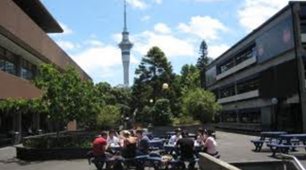
The Sky Tower from the UoA campus (Photo: Eun Hae Jho).
Is there a difference in the type of people you’ve met?
My colleagues in UoA were all from different countries – about a half of them continued their degrees after finishing their Bachelor’s at UoA and the other half came from overseas to continue with either a Master’s or PhD degree – so I could experience and learn about other cultures through my colleagues. My colleagues (PhD and Master’s Students and Post-doc fellows) here in SNU are all Koreans and most of them have been at SNU since their Bachelor’s degree. So other than going to conferences, they’ve hardly spent any time abroad.
Female students usually have more freedom in choosing their career after finishing their Master’s degree as they do not have military service duty. Male students usually continue up to Master’s degree and then find a job or go overseas to continue with their PhD degree, but only if they have already finished with their military service. If they haven’t finished the duty, they go into the army after finishing their Master’s degree or some of them can continue with a PhD degree if they pass a test.
When I was at UoA, my supervisors were just like my friends with more experience and expertise so they were not “hard to reach” people. But here in SNU, my colleagues think their supervisors are “hard to reach”, which I don’t think is because of the supervisors. I think it is largely due to the different cultures and different ways of expressing respect to the supervisors.
How do work practices differ?
My colleagues in UoA spent most of their time working on their own research, but the colleagues in SNU work on a number of projects including their own research, other students’ research, and they also do all the administrative work needed to run the lab. Thus, their usual working hours are 10-12 hours and if they run experiments their day becomes longer.
In UoA, my colleagues discussed their research and shared their ideas and thoughts, but they worked on their own experiments in the lab. They asked their friends when they needed more hands so we were not physically involved in other people’s work. However, here in SNU, my colleagues physically work together to do experiments in the lab so that everyone learns commonly used analytical procedures (e.g., heavy metal extraction, microbial counting) and how to use instruments (e.g., GC, LC) in the lab. I am used to working on my own, organizing things for my experiments and running them. So, since I started working at SNU, I have been learning how to work together, showing colleagues how to do things if they do something for the first time.
The only thing I am still not used to is that I do not have any colleagues to have morning and afternoon tea with as there is no culture of set tea times in Korea.
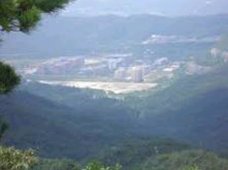
View of SNU from Mt. Gwanak (Photo: Eun Hae Jho).
Are the labs similar?
The Department of Civil and Environmental Engineering in SNU is larger than that at UoA; there are many different labs with various facilities that I can get access to with ease. In UoA, there is only one lab in the Department and postgraduate students with different supervisors share it. There is a lab technician who looks after all the instruments and manages the lab in UoA, thus, much of the lab maintenance related work is done by the technician. However, here in SNU, the postgraduate students manage the lab and this adds more workload to the students, but since the lab is specifically for the postgraduates of the Soil Quality Laboratory, its management is easier than when you share the lab with other postgraduate students.
Do/did you teach other students at either of the universities?
At UoA, my supervisors preferred Masters and PhD students to concentrate on their research rather than spending time here and there, so I tried not to teach students. But I could still fit in some work as a teaching assistant for two semesters, which only involved marking students’ assignments and not actual teaching. Some of my colleagues were involved in teaching in the lab.
Here, at SNU, my colleagues also work as teaching assistants and they could be involved with marking only or teaching lab classes. I have also taught microbial techniques (i.e., how to grow bacteria on agar plate, how to extract bacterial DNA and do PCR, etc.) in a lab class. Currently, I am giving lectures at a different university about environmental chemistry and I really enjoy it.
Thank you for sharing your experiences with us and the ChemistryViews readers.
Also of interest
- Blog: Post-doc in Paris 1,
What is a Post-Doc in Paris like? Tibiriçá Gonçalves Vasconcelos shares his experiences in a new Blog.
